About 25 and 45 million people in the United States suffer from Irritable Bowel Syndrome (IBS). The condition that has gained much popularity with worsening food habits is characterized by abdominal pain and changes in bowel habits such as constipation and more.
Doctor shares 10 fruits to help with bowel movement
Recently, Dr Joseph Salhab, a gastroenterologist with over 1.5M followers on Instagram, shared a video on fruits that will help you with bowel movement and digestion. "Each one of these fruits has a unique combination of ingredients, polyphenols, prebiotic fibre to help stimulate bowel movements," wrote the doctor in the caption of the video that has already received 4K likes and numerous comments appreciating his efforts. Take a look.
Dragonfruit
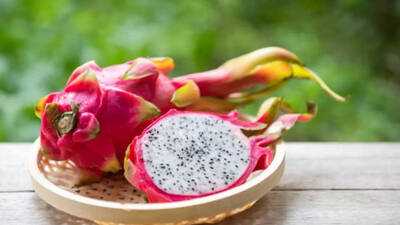
Popularly known as Pitaya, dragonfruit was at the top of the doctor's list for all the right reasons. While it originated in Central America, over the years it has become quite popular across the world. It is rich in both soluble and insoluble dietary fibres, making it effective in promoting regular bowel movements and preventing constipation.
Prunes

A study published in the Clinical Nutrition journal analysed the effect of prunes on stool output. Dried plums or prunes are known to healthier bowel movements. The participants who consumed 80g/d prunes for 4 weeks had the highest development in stool weight and frequency. Thus, adding them to your daily diet can be effective in helping with digestion.
Mango
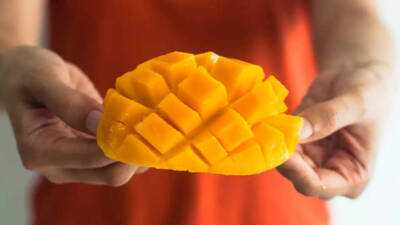
Mangoes are rich in bioactive phytochemicals such as flavonoids, phenolic acids and fibre, which are healthy for digestion and bowel movements. According to a study published in Food Science & Nutrition found that daily consumption of 100 g fresh mango increased the diversity in gut microbiome after 4 weeks and had positive impacts on chronic inflammation and irritable bowel syndrome.
Pears
Pearsare cultivated in countries such as Europe, parts of Asia, South America and North America. They are high in dietary fibre and fructose, thus having high laxative properties. They also contain sorbitol, which combined with previous two nutrients improves gut health and prevents constipation.
Apples
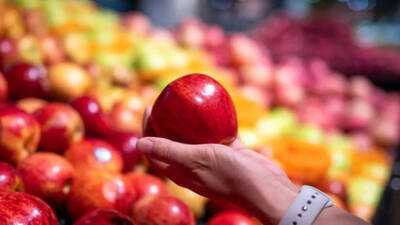
Originally grown in Asia, apples are a popular fruit suggestion by doctors. The fruit is 80% water and the rest of it contains various nutrients such as five main subgroups of phenolic compounds. They also contain phytochemicals and fibre, all of which prevent constipation and prevent chronic diseases such as bowel disorders.
Tamarind
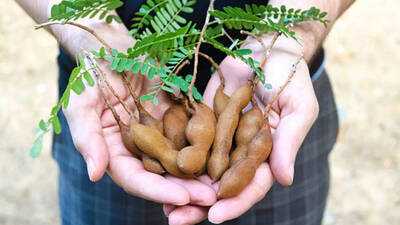
Tamarind, the fruit of tamarind tree is native to Africa. Due to its richness in minerals, fibre and tartaric acid it has numerous digestive benefits. It contains soluble fibres such as pectin that facilitate the digestive process and tartaric acid which regulates and prevent constipation. It also promotes the development of good bacteria called probiotics.
Oranges

Oranges support digestion through their high fibre content that not only regulates the bowel routine but also adds bulk to the stool and prevents constipation. They contain both soluble and insoluble fibre; while the first one forms a gel-like substance in the digestive tract and helps slow down digestion to absorb nutrients, the second adds bulk to the stool.
Papaya
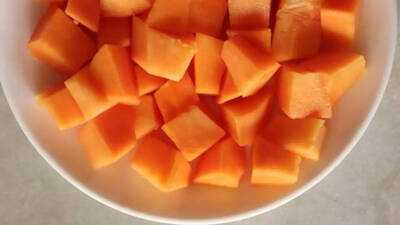
Papaya might not be everyone's favourite fruit, but your digestive system will surely love it. The fruit has a natural enzyme called papain which breaks down the proteins in the stomach, making them easier to digest. Its high fibre content supports consistent bowel movements whereas Vitamin C and beta-carotene contributes to overall gut health.
Cherries

As per a study published in the Journal of Nutritional Biochemistry, tart cherries commonly grown in the US have a positive impact on the gut microbiome. It consists of beneficial polyphenols, which are broken down by the gut microbes to actively stimulate the growth of healthy gut bacteria. As a result, they help reduce the risk of IBD, obesity, and even oxidative cell damage in the sensitive gastrointestinal area.
Kiwi
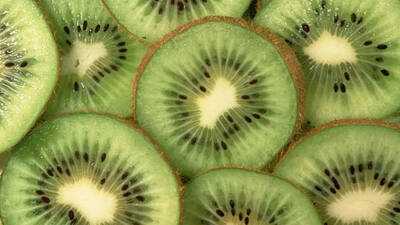
Kiwi is a fruit that provides over 10% of the daily dietary fibre requirement. It consists of both soluble and insoluble fibres, which increase the water content in the body, causing soft, bulky and consistent stools. Additionally, green kiwi also has a proteolytic enzyme called actinidin that reduces the digestion time and aids in protein digestion.
Doctor shares 10 fruits to help with bowel movement
https://www.instagram.com/reel/DOPIgihERP4/ https://www.instagram.com/reel/DOPIgihERP4/
Recently, Dr Joseph Salhab, a gastroenterologist with over 1.5M followers on Instagram, shared a video on fruits that will help you with bowel movement and digestion. "Each one of these fruits has a unique combination of ingredients, polyphenols, prebiotic fibre to help stimulate bowel movements," wrote the doctor in the caption of the video that has already received 4K likes and numerous comments appreciating his efforts. Take a look.
Dragonfruit
Popularly known as Pitaya, dragonfruit was at the top of the doctor's list for all the right reasons. While it originated in Central America, over the years it has become quite popular across the world. It is rich in both soluble and insoluble dietary fibres, making it effective in promoting regular bowel movements and preventing constipation.
Prunes
A study published in the Clinical Nutrition journal analysed the effect of prunes on stool output. Dried plums or prunes are known to healthier bowel movements. The participants who consumed 80g/d prunes for 4 weeks had the highest development in stool weight and frequency. Thus, adding them to your daily diet can be effective in helping with digestion.
Mango
Mangoes are rich in bioactive phytochemicals such as flavonoids, phenolic acids and fibre, which are healthy for digestion and bowel movements. According to a study published in Food Science & Nutrition found that daily consumption of 100 g fresh mango increased the diversity in gut microbiome after 4 weeks and had positive impacts on chronic inflammation and irritable bowel syndrome.
Pears

Pearsare cultivated in countries such as Europe, parts of Asia, South America and North America. They are high in dietary fibre and fructose, thus having high laxative properties. They also contain sorbitol, which combined with previous two nutrients improves gut health and prevents constipation.
Apples
Originally grown in Asia, apples are a popular fruit suggestion by doctors. The fruit is 80% water and the rest of it contains various nutrients such as five main subgroups of phenolic compounds. They also contain phytochemicals and fibre, all of which prevent constipation and prevent chronic diseases such as bowel disorders.
Tamarind
Tamarind, the fruit of tamarind tree is native to Africa. Due to its richness in minerals, fibre and tartaric acid it has numerous digestive benefits. It contains soluble fibres such as pectin that facilitate the digestive process and tartaric acid which regulates and prevent constipation. It also promotes the development of good bacteria called probiotics.
Oranges

Oranges support digestion through their high fibre content that not only regulates the bowel routine but also adds bulk to the stool and prevents constipation. They contain both soluble and insoluble fibre; while the first one forms a gel-like substance in the digestive tract and helps slow down digestion to absorb nutrients, the second adds bulk to the stool.
Papaya
Papaya might not be everyone's favourite fruit, but your digestive system will surely love it. The fruit has a natural enzyme called papain which breaks down the proteins in the stomach, making them easier to digest. Its high fibre content supports consistent bowel movements whereas Vitamin C and beta-carotene contributes to overall gut health.
Cherries

As per a study published in the Journal of Nutritional Biochemistry, tart cherries commonly grown in the US have a positive impact on the gut microbiome. It consists of beneficial polyphenols, which are broken down by the gut microbes to actively stimulate the growth of healthy gut bacteria. As a result, they help reduce the risk of IBD, obesity, and even oxidative cell damage in the sensitive gastrointestinal area.
Kiwi
Kiwi is a fruit that provides over 10% of the daily dietary fibre requirement. It consists of both soluble and insoluble fibres, which increase the water content in the body, causing soft, bulky and consistent stools. Additionally, green kiwi also has a proteolytic enzyme called actinidin that reduces the digestion time and aids in protein digestion.
You may also like

Vijay Antony's 'Nooru Saami' will revolve around the bond between a mother and son, confirms director Sasi (IANS Exclusive)

Monsoon havoc blocks 598 roads, disrupts water supply in Himachal Pradesh; death toll reaches 404

SC stays certain provisions Waqf (Amendment) Act 2025

Qatar PM Condemns Israeli Strike On Doha As State Terrorism, Vows To Defend Sovereignty At All Costs

Meet 'Gutthi's' wife Aarti, Sunil Grover's wife earns no less than him, lives a simple life away from the camera






